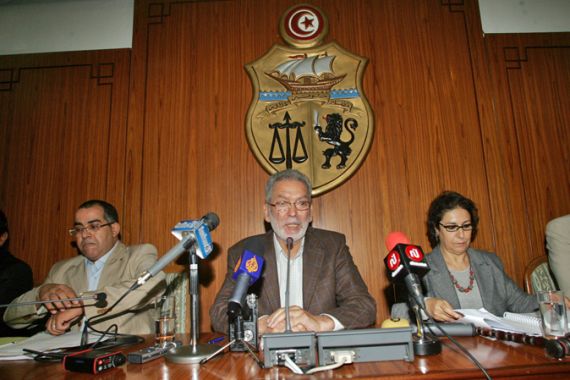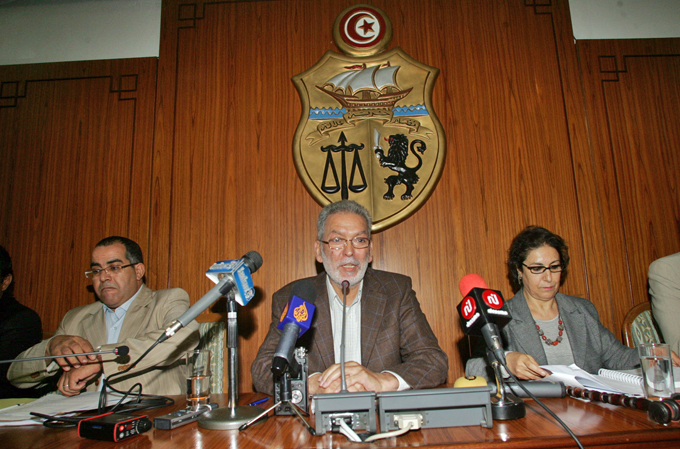Tunisian elections: Gone till October?
Postponing elections in Tunisia will allow citizens to first test their mettle in an empowered society

 |
| Elections originally planned for July may be postponed until October 2011, which should give Tunisians more time to adjust to a new body politic [EPA] |
Common sense has finally prevailed, or has it. As I predicted, the High Commission for the Fulfilment of the Revolutionary Goals, Political Reform and Democratic Transition has suggested to postpone the elections in Tunisia to October 16, rather than continuing with the previously scheduled July timetable.
There are, I believe, reasonable and defensible grounds for this timely and judicious decision.
Tunisians are fearlessly exercising their newly earned freedoms, and the first thing to go were any sacred cows. Secular, liberal, leftist and religious politics are now all equally debated, scrutinised and even scorned, whereas before, such discourse was strained. Even hardcore partisans do not put their leaders above criticism or on a higher pedestal.
This marks a new departure in what might be termed Tunisia’s political culture: a shift from deferential attitudes to participatory ‘boulitik‘ – a pejorative description of doing politics in Tunisian vernacular.
Democratic distemper
And now, all of a sudden, it is as if there is too much democracy – unimaginable a few months ago. A once-starved fortress of political thought and deliberation besieged by Ben Ali now has mastered the art of deliberation in a variety of registers. Professional elite politics, endless political new media freelancing and cafe politics – where the bulk of protesters take breathers – tests the pulse of the national mood, caricatures the octogenarian leadership and laughs at the expense of all parties and leaders.
The nation is inhaling the fresh air of freedom, curing the body politic’s respiratory system. The media of political vocalisation – and with it the creation of a political public and active polity – needs the intensive exercise, learning, and respite of and from formal politics.
Holding elections too soon risks discombobulating a euphoric feeling of freedom that Tunisians are experiencing, as if they are living without a state. Just like the Egyptians, for too long have Tunisians lived with statism – they lived and died by it. Today, all symbols of statism are under scrutiny by a mobilised public; statesmen are petrified and instilled with fear – an ironic reversal of roles has taken place.
Maybe this is healthy for re-launching politics on the basis of equality, mutuality and reciprocity of state and society in a genuine democracy.
Inaugurating free and fair elections
The “supplementary time”, if it can be called that, will not go to waste. There is a learning curve; the public must taste un-governability before they can test governability.
The test of freedom and fairness calls for the delay – there must be a gestation period. There are a thousand and one questions for which there are no easy answers. Right now, there are more parties than socio-political capital. Tunisians are smart, aware, and would exercise their power through the choice of non-voting if elections were held today.
There are more than thirty parties, the bulk of which were licensed by the interim government only recently. Some are high profile, but all the parties tend to be short-listed in the Tunisian public consciousness, mostly by association with a figure or leader rather than policy.
Indeed, political parties are meant to be drenched in politics. Tunisian political parties overdo politics and culture. Were one to hold an unrehearsed election debate involving the creme de la creme of Tunisia’s partyism, one discovery would be certain: All would radiate when talking literature, poetry, philosophy, grammar, religion, and history. But all would disappoint if engaged on the market, international finance, trade, industry, sustainable development, and most importantly, youth and graduate employment.
Most parties have almost forgotten why Tunisia’s youth protested fearlessly and ousted Ben Ali, and why Bouazizi committed his act of self-immolation. The interim government is up to its neck playing politics, forgetting that in the modern world, there is something called the “political economy”. It could have created a high commission for sustainable development and youth employment. Note all three high commissions have nothing to do with this agenda.
The new October 16 date is needed for the public to know exactly what is at stake through the country’s first test at the polls: elections with democracy and bread, or elections with more ‘boulitik‘.
Answering questions locally
Tunisia is not going to be a beacon of democratic innovation if the democracy of the new deal is going to reproduce the economic shackles and unequal opportunities between regions and individuals of the ousted regime.
A key answer Tunisians must face up to is what they are voting for on October 16, and whether the constituent assembly they will vote for will be tasked with re-writing not only a constitution for power sharing, but also the terms of a new deal for sharing wealth, jobs, opportunities and citizenship.
Failing that, those who have ventured into the country’s impoverished central and southern regions will have noticed the abundance of prospective Bouazizis and other human fodder for new revolts and upheavals. The answers in the new Tunisia for this vexing and sore problem will have to be found locally, sparing Tunisia the future of a banana republic, aid-dependence, or out-and-out capitulation to excessive foreign capital.
For those banking on charity for running a modern economy, they are invited to re-think by studying other Muslim transitional economies, such as those of Malaysia, Turkey and Indonesia.
Milestones have been achieved. The new electoral law adopted formally only a few days ago is a triumph for Tunisia’s people. Its stress on ethics, banning torture, a ban on clashes of interests, and its affirmation of gender parity are historic.
Tiny Tunisia will be the first country on the face of the planet with gender parity adopted as law. It is a triumph for all women, and a challenge for other liberalising states, Arab and non-Arab to rise up to. But the test here will be how well will economically disenfranchised women – from the south or the centre – fare in the polls. There are issues of opportunity, social capital, capacity, access, awareness, and power involved.
Testing weakness
But the October 16 polls will be first and foremost a test of weakness.
Weakness, for instance, shows in the conspicuous absence of more youth representation. Tunisia suffers from political ageism despite being fundamentally endowed with a sizeable youth population. Interim premier Beji Caid Essebsi is a spent force. He was on the scene when newly independent Tunisia in the 1960s voted for its first Constituent Assembly. His cameo re-appearance and “apparition” is emblematic of paralysis within high political cadres.
There are no charismatic leaders, although Abdelfattah Morou (Islamist, formerly Nahda), and Nejib Chebbi, before joining the first interim government, could fit the bill.
The secular-Islamist cleavage has reared its ugly head in recent duels between two main political ideological lines in Tunisia. This will continue, and is already re-emerging in media representations as well as in new media narratives and other types of political activism, including on university campuses.
Then there is the test of what to do with those former members of the banned RCD party now relegated to the political wilderness, either for close association with the ousted regime (as if the interim president or Chief of the National Army who partly decided the ouster of Ben Ali were not servants of the regime) or for crimes against the people.
Finally, it will remain to be seen whether the post-October 16 Tunisia passes the test of living with and championing difference.
Only by passing the litmus test of weakness will new a Tunisia be able to pass the test of democratic transition.
Dr Larbi Sadiki is a Senior Lecturer in Middle East Politics at the University of Exeter, and author of Arab Democratization: Elections without Democracy (Oxford University Press, 2009) and The Search for Arab Democracy: Discourses and Counter-Discourses (Columbia University Press, 2004).
The views expressed in this article are the author’s own and do not necessarily reflect Al Jazeera’s editorial policy.
